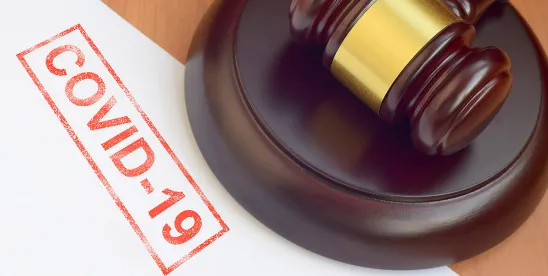The Supreme Courts of Pennsylvania and North Carolina have issued two of what are presumably the last state supreme court decisions in COVID-19 business interruption insurance cases. While they reached split results (with the Pennsylvania court ruling for the insurer and the North Carolina court ruling for policyholders in a case without a virus exclusion), as a practical matter, this is unlikely to have a substantial impact on the insurance industry.
Overview
In Ungarean v. CNA, 323 A.3d 593 (Pa. 2024), the Pennsylvania Supreme Court ruled for the insurer, reversing an intermediate appellate court decision that had found coverage for business income losses resulting from COVID-19 government orders restricting the operations of a dental practice. Construing the meaning of “direct physical loss of or damage to property” together with the policy’s definition of “period of restoration,” the court held that “there must be some physical alteration to the subject property necessitating repairs, rebuilding, or entirely replacing the property either at the same location or a new one.” Merely economic losses were not covered. Pennsylvania joined a near-unanimous consensus of other courts, although the court noted that it based its decision on the policy language and not the decisions of other courts.
The Result
It appeared insurers would achieve a complete victory at the state supreme court level until the North Carolina Supreme Court’s recent rulings. In North State Deli, LLC v. Cincinnati Insurance Company, 908 S.E.2d 802 (N.C. 2024), that court surprisingly departed from the overwhelming nationwide consensus. Construing the words “direct physical loss” differently from all of the other state high courts that have addressed the issue, the North Carolina court held that restrictions on restaurant operations during the pandemic could reasonably be considered “material deprivation of property,” notwithstanding that the property itself was not harmed and could be used for various purposes, including to provide food for takeout and delivery service.
The definition of “period of restoration” did not aid the insurer because, unlike most policies (including the one in Ungarean), this one was construed to provide up to 12 months of coverage even if there was no need to repair or replace property or move to a new location. So, the plaintiffs’ bar, pressing on after dozens of defeats, eked out one win—which will likely be a pyrrhic victory. Even if the different policy wording in Ungarean would not have changed the outcome, the good news for insurers is that property insurance policies in North Carolina generally have two or three-year suit limitation provisions. In addition, on the same day that North State Deli was decided, the North Carolina high court issued a second opinion, enforcing a contamination exclusion in a COVID-19 case: Cato Corporation v. Zurich American Insurance Co., 386 S.E.2d 667(N.C. 2024). So even if a few remaining cases are pending in North Carolina lower courts, the insurer should prevail if the policy has a virus or contamination exclusion.
Takeaways for Insurers
Although insurers failed to obtain a complete shutout in these cases at the state supreme court level, given that contractual suit limitation periods in North Carolina have expired and many policies have virus exclusions, North State Deli is unlikely to be of significant concern to the industry.



 />i
/>i
